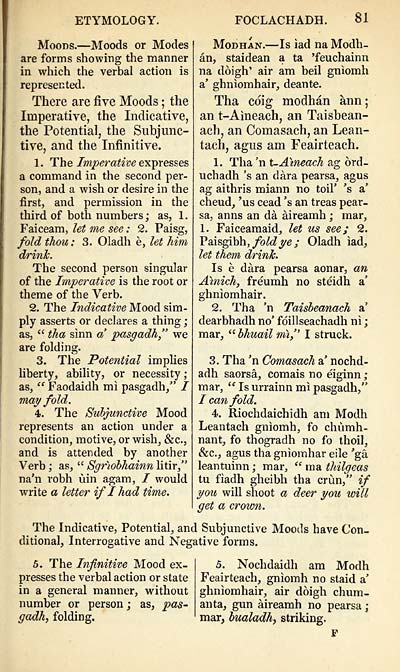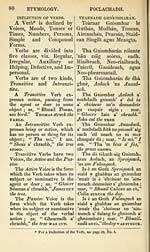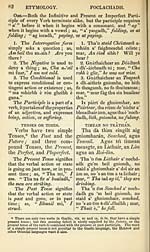Books and other items printed in Gaelic from 1841 to 1870 > Stéidhean a' Ghràmair Ghaëlig
(109) Page 81
Download files
Complete book:
Individual page:
Thumbnail gallery: Grid view | List view

ETYMOLOGY.
FOCLACHADH. 81
Modhan. — Is ìad na Modh-
àn, staidean a ta 'feuchainn
na dòigh' air am beil gnìomh
a' ghnìomhair, deante.
Tha cdig modhàn ànn;
an t-Aìneach, an Taisbean-
ach, an Comasach, an Lean-
tach, agus am Feairteach.
1. Tha 'n t-Aìneach ag òrd-
uchadh 's an dàra pearsa, agus
ag aithris miann no toil* 's a'
cheud, 'us cead 's an treas pear-
sa, anns an dà àireamh ; mar,
1. Faiceamaid, let us see; 2.
Vaisgibh, fold ye ; Oladh ìad,
let them drinh.
Is è dàra pearsa aonar, an
Aìnìch, frèumh no stèidh a'
ghnìomhair.
2. Tha 'n Taisbeanach a'
dearbhadh no' fòillseachadh nì ;
mar, " bhuail mì," I struck.
3. Tha 'n Comasach sl' nochd-
adh saorsà, comais no èiginn ;
mar, " Is urrainn mì pasgadh,"
/ can fold.
4. Riochdaichidh am Modh
Leantach gnìomh, fo chùmh-
nant, fo thogradh no fo thoil,
&c, agus tha gnìomhar eile 'gà
leantuinn ; mar, " ma thilgeas
tu fiadh gheibh tha crùn," if
2/ou will shoot a deer you will
get a crown.
The Indicative, Potential, and Subjunctive Moods have Con-
ditional, Interrogative and Negative forms.
Moods. — Moods or Modes
are forms showing the manner
in which the verbal action is
represented.
There are five Moods ; the
Imperative, the Indicative,
the Potential, the Subjunc-
tive, and the Infinitive.
1. The Imperative expresses
a command in the second per-
son, and a wish or desire in the
first, and permission in the
third of both numbers; as, 1.
Faiceam, let me see : 2. Paisg,
fold thou: 3. Oladh è, let him
drink.
The second person singular
of the Imperative is the root or
theme of the Verb.
2. The Indicative Mood sim-
ply asserts or declares a thing ;
as, " tha sìnn a' pasgadh," we
are folding.
3. The Potential implies
liberty, ability, or necessity ;
as, " Faodaidh mì pasgadh," I
may fold.
4. The Subjunctive Mood
represents an action under a
condition, motive, or wish, &c,
and is attended by another
Verb ; as, " Sgrìobhainn litir,"
na'n robh ùin agam, / would
write a letter if lhad time.
5. The Infinitive Mood ex-
presses the verbal action or state
in a general manner, without
number or person ; as, pas-
gadh, folding.
5. Nochdaidh am Modh
Feairteach, gnìomh no staid a'
ghnìomhair, air dòigh chum-
anta, gun àireamh no pearsa ;
mar, bualadh, striking.
p
FOCLACHADH. 81
Modhan. — Is ìad na Modh-
àn, staidean a ta 'feuchainn
na dòigh' air am beil gnìomh
a' ghnìomhair, deante.
Tha cdig modhàn ànn;
an t-Aìneach, an Taisbean-
ach, an Comasach, an Lean-
tach, agus am Feairteach.
1. Tha 'n t-Aìneach ag òrd-
uchadh 's an dàra pearsa, agus
ag aithris miann no toil* 's a'
cheud, 'us cead 's an treas pear-
sa, anns an dà àireamh ; mar,
1. Faiceamaid, let us see; 2.
Vaisgibh, fold ye ; Oladh ìad,
let them drinh.
Is è dàra pearsa aonar, an
Aìnìch, frèumh no stèidh a'
ghnìomhair.
2. Tha 'n Taisbeanach a'
dearbhadh no' fòillseachadh nì ;
mar, " bhuail mì," I struck.
3. Tha 'n Comasach sl' nochd-
adh saorsà, comais no èiginn ;
mar, " Is urrainn mì pasgadh,"
/ can fold.
4. Riochdaichidh am Modh
Leantach gnìomh, fo chùmh-
nant, fo thogradh no fo thoil,
&c, agus tha gnìomhar eile 'gà
leantuinn ; mar, " ma thilgeas
tu fiadh gheibh tha crùn," if
2/ou will shoot a deer you will
get a crown.
The Indicative, Potential, and Subjunctive Moods have Con-
ditional, Interrogative and Negative forms.
Moods. — Moods or Modes
are forms showing the manner
in which the verbal action is
represented.
There are five Moods ; the
Imperative, the Indicative,
the Potential, the Subjunc-
tive, and the Infinitive.
1. The Imperative expresses
a command in the second per-
son, and a wish or desire in the
first, and permission in the
third of both numbers; as, 1.
Faiceam, let me see : 2. Paisg,
fold thou: 3. Oladh è, let him
drink.
The second person singular
of the Imperative is the root or
theme of the Verb.
2. The Indicative Mood sim-
ply asserts or declares a thing ;
as, " tha sìnn a' pasgadh," we
are folding.
3. The Potential implies
liberty, ability, or necessity ;
as, " Faodaidh mì pasgadh," I
may fold.
4. The Subjunctive Mood
represents an action under a
condition, motive, or wish, &c,
and is attended by another
Verb ; as, " Sgrìobhainn litir,"
na'n robh ùin agam, / would
write a letter if lhad time.
5. The Infinitive Mood ex-
presses the verbal action or state
in a general manner, without
number or person ; as, pas-
gadh, folding.
5. Nochdaidh am Modh
Feairteach, gnìomh no staid a'
ghnìomhair, air dòigh chum-
anta, gun àireamh no pearsa ;
mar, bualadh, striking.
p
Set display mode to:
![]() Universal Viewer |
Universal Viewer | ![]() Mirador |
Large image | Transcription
Mirador |
Large image | Transcription
Images and transcriptions on this page, including medium image downloads, may be used under the Creative Commons Attribution 4.0 International Licence unless otherwise stated. ![]()
| Rare items in Gaelic > Books and other items printed in Gaelic from 1841 to 1870 > Stéidhean a' Ghràmair Ghaëlig > (109) Page 81 |
|---|
| Permanent URL | https://digital.nls.uk/101712907 |
|---|
| Description | Out-of-copyright books printed in Gaelic between 1631 and 1900. Also some pamphlets and chapbooks. Includes poetry and songs, religious books such as catechisms and hymns, and different editions of the Bible and the Psalms. Also includes the second book ever published in Gaelic in 1631. |
|---|

